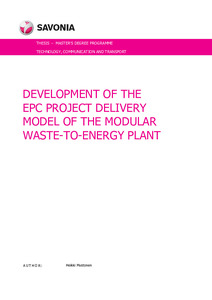Development of the EPC project delivery model of the modular Waste-to-Energy plant
Mustonen, Heikki (2023)
Mustonen, Heikki
2023
All rights reserved. This publication is copyrighted. You may download, display and print it for Your own personal use. Commercial use is prohibited.
Julkaisun pysyvä osoite on
https://urn.fi/URN:NBN:fi:amk-2023121337020
https://urn.fi/URN:NBN:fi:amk-2023121337020
Tiivistelmä
This research work was commissioned by Woima Finland Oy to support the development of international project activities. The aim of this thesis was to develop an EPC project delivery model for Woima Finland Oy's modular Waste-to-Energy plant, where the EPC supplier is responsible for the project management, logistics, installation and commissioning of the overall project in the global market.
Woima Finland Oy (later WOIMA) and the EPC supplier started co-operation in January 2021 and since then the parties in this co-operation project have investigated and developed plans, collaboration procedures and processes related to sales, project delivery, installation, and commissioning of the product. The research material was collected by interviewing people from both companies who participated in the collaboration. This material of interviews was analyzed using theory driven content analysis to find possible bottlenecks related to the project's delivery model and to make suggestions for improvement already at this stage of the co-operation project.
By combining the research data with previous research findings, a delivery model was found to achieve competitive delivery time and quality as well as sufficient price competitiveness. In addition, it should be noted that the goal of this delivery model was to meet the business needs of both companies, to streamline the delivery processes, considering differences in size and ways of doing projects of the companies while aligning the joint value chain in accordance with product features and benefits.
Woima Finland Oy (later WOIMA) and the EPC supplier started co-operation in January 2021 and since then the parties in this co-operation project have investigated and developed plans, collaboration procedures and processes related to sales, project delivery, installation, and commissioning of the product. The research material was collected by interviewing people from both companies who participated in the collaboration. This material of interviews was analyzed using theory driven content analysis to find possible bottlenecks related to the project's delivery model and to make suggestions for improvement already at this stage of the co-operation project.
By combining the research data with previous research findings, a delivery model was found to achieve competitive delivery time and quality as well as sufficient price competitiveness. In addition, it should be noted that the goal of this delivery model was to meet the business needs of both companies, to streamline the delivery processes, considering differences in size and ways of doing projects of the companies while aligning the joint value chain in accordance with product features and benefits.
